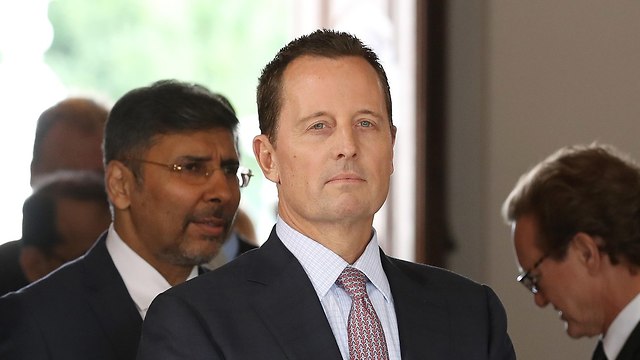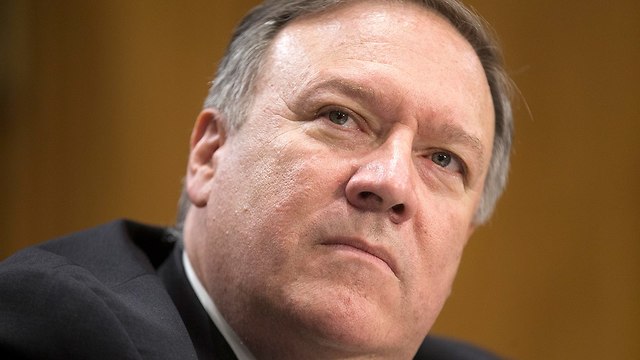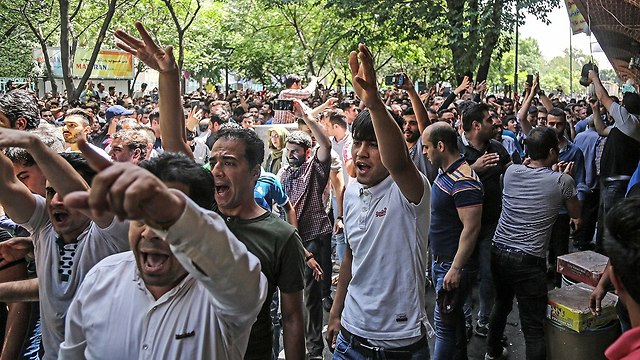

US envoy calls for Germany to block Iran cash withdrawal
Richard Grenell, a longtime critic of nuclear accord, tells German media US government extremely concerned about Tehran's plans to transfer hundreds of millions of euros in cash to Iran, while Pompeo warns of ‘a real high cost’ for Iran threatening oil supply disruptions.
The US ambassador to Germany has called on Berlin to block an Iranian bid to withdraw large sums of cash from bank accounts in the country to offset the effect of new US financial sanctions imposed after Washington withdrew from a 2015 nuclear deal.
Richard Grenell, a longtime critic of the accord, told the mass-circulation daily Bild that the US government was extremely concerned about Tehran's plans to transfer hundreds of millions of euros in cash to Iran.
"We encourage the highest levels of the German government to intervene and stop the plan," Grenell told daily newspaper Bild.
Grenell has adopted a more outspoken role than his predecessor since arriving in Berlin in May, drawing criticism for what some German politicians view as meddling in German politics.
A German Finance Ministry spokeswoman on Monday said German authorities were examining the Iranian request. The ministry had no immediate comments on Grenell's comments.
Bild first reported on Monday that German authorities were considering a request by Iran to withdraw 300 million Euros ($350 million) from bank accounts held in Germany and to transfer the cash to Iran.
Pompeo talks tough on Iran
In a separate development on Iran, US Secretary of State Mike Pompeo said on Tuesday that America and its Gulf Arab allies want to show Iran that its actions have "a real high cost," stepping up his warnings after Tehran threatened to disrupt Mideast oil supplies.
Pompeo's comments came during a short trip to the United Arab Emirates, a staunch US ally that hosts some 5,000 American forces at a crucial air base and the US Navy's busiest foreign port of call.
He stopped short of offering any specifics during an interview with Sky News Arabia, an Arab satellite news channel half owned by Abu Dhabi ruling family member Sheikh Mansour bin Zayed Al Nahyan, a UAE deputy prime minister.
However, his message undoubtedly reached receptive ears. The UAE long has been suspicious of Iran and its nuclear deal with world powers.
"The one that we are most focused on today is ... that we deny Iran the financial capacity to continue this bad behavior," Pompeo said. "So it's a broad range, a series of sanctions aimed not at the Iranian people, but rather aimed at the single mission of convincing the Iranian regime that its malign behavior is unacceptable and has a real high cost for them."
Pompeo made a point to mention recent threats by Iranian President Hassan Rouhani over the Strait of Hormuz, through which a third of all oil traded by sea passes. While in Europe last week, Rouhani said any disruption to Iran's oil exports would result in the whole region's exports being disrupted.
Iran "should know that America is committed to keeping sea lines open, keeping the transit of oil available for the entire world," Pompeo said. "That's the commitment we have had for decades. We continue under that commitment."
In Tehran, Iran's deputy parliament speaker Ali Motahari praised Rouhani for making the threat.
"The American are not ready for any new war in the Persian Gulf so the president's remark was a good threat which will have positive impacts and will be a deterrent factor against cutting Iran's oil export," Motahari said, according to a report on parliament's website.
Global oil prices have risen on the expectation that the United States will push its allies to stop importing Iranian crude oil, further tightening the world energy supplies. While allies like Saudi Arabia, the UAE and Kuwait say they are willing to increase their own production as necessary, additional output may not be enough to satiate demand.
Already, regular gasoline prices in the US are $2.86 a gallon, up from $2.26 the year before, according to AAA. Trump himself has been tweeting that oil suppliers must do more to lower prices ahead of midterm elections this fall.
US benchmark crude traded near $75 a barrel on Tuesday, while Brent crude traded near $80.
While State Department officials earlier acknowledged that some allies will get waivers to continue importing Iranian oil, Pompeo seemed to strike a harder line Tuesday. He warned such imports largely would be "sanctionable activity and we will enforce those sanctions."
"We will consider (waivers) but make no mistake about it: We are determined to convince the Iranian leadership that this malign behavior won't be rewarded and that the economic situation in the country will not be permitted to be rectified until such time that they become a more-normal nation," he said.
Among the top importers of Iranian oil are China, India, Turkey and South Korea.
In a separate interview with Abu Dhabi's English-language newspaper The National, also owned by Sheikh Mansour, Pompeo targeted Iranian Gen. Qassem Soleimani. Solemani leads the expeditionary Quds Force of Iran's hard-line paramilitary Revolutionary Guard.
"Qassem Soleimani is causing trouble throughout Iraq and Syria and we need to raise the cost for himfor his organization and for him personally," Pompeo said, without elaborating.
Pompeo met Abu Dhabi's powerful crown prince, Sheikh Mohammed bin Zayed Al Nahyan, and Foreign Minister Abdullah bin Zayed Al Nahyan while on his short trip to the UAE. He also stopped by the US Embassy in Abu Dhabi.
Pompeo, who earlier visited Afghanistan, Japan, North Korea and Vietnam on his trip, left the UAE heading for a NATO summit in Brussels that Trump will attend.




















